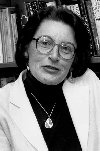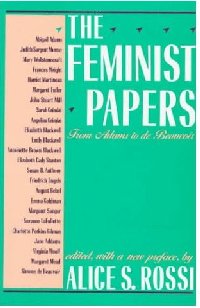ALICE ROSSI, FEMINIST ICON In the years before the founding of NOW, no matter how brilliant, educated and ambitious they were, women were expected to be wives and mothers only. But not Alice Rossi. She was out in the world working, studying and active in political causes. Yet she wasn't really aware of feminism until she was in her 40's, she says, when she became an enthusiastic proselytizer for women’s rights. Always politically active for the socialist cause, Alice finally awoke to sexist discrimination: she and other women were doing all the work and the men were getting all the credit. "That's when I began to write and talk about women's rights."  In 1964 her groundbreaking article “Equality Between the Sexes: An Immodest Proposal” was published in Daedalus and reprinted the following year in Women in America. It has never ceased to inspire and astound. Not content to simply define sex equality, she offered a program to achieve it: First was the provision of a network of childcare centers. Second—and remember, it was two years before the founding of NOW—was equality between the sexes, not yet a widespread societal goal. Her third, anticipating much of the early work of Second Wave feminists, was to de-sex-link [her term] occupations and to focus on how girls and women make occupational choices. “My theme was simple enough,” she says. “I wrote that motherhood had become a full-time occupation for adult women, and motherhood was not enough. For the psychological and physical health of mother and child, and for the progress of society, equality between men and women was essential and inevitable. “My argument for equality was mild indeed, but the reaction of traditionalists in 1964 was not. I was considered by some a monster, an unnatural woman, and an unfit mother. My husband, also a sociologist, received an anonymous condolence card lamenting the death of his wife.” By now Alice was highly respected for her writings and speeches in that small world of aware women. In 1966, Katherine Clarenbach, head of the Status of Women Commission, urged her to attend their national conference in Washington DC. There she met Betty Friedan who, after the great success of The Feminine Mystique, was being pressured and was pressuring others to start an NAACP for women, and was at the conference urging attendees to leave the Status of Women Commission to start an activist feminist organization. Katherine, still hopeful that the Commission would include her women's rights agenda, at first refused to go along with Betty. But it became clear that the Commission had no plans to go beyond its limited docket, so at the closing luncheon on the final day of the conference she, with Alice, Gene Boyer, Mary Eastwood, Catherine Conroy and a few others joined Betty at her table and while the luncheon speaker droned on, planned the organizing of NOW. Alice recalls that there were hours of discussion later as to whether it should be the National Organization OF Women, or FOR Women, and she was adamant that it should be FOR Women. "If men aren't included," she reasoned, "we'll not be paid attention to." She helped write the Statement of Purpose. Alice was not only in that historic founding group, but also served on the national board for four years.  Editor of the acclaimed Feminist Papers featuring works from Adams to de Beauvoir, Alice also wrote The Family with Harvard psychologist Jerome Kagan and in 1973 Academic Women on the Move. She founded and was first president of Sociologists for Women in Society and in 1969 an organizer of the Women’s Caucus, ASA, and chair of Women in Academe AAUP. In 1977 she was appointed a Commissioner of IWY by President Carter. Born Alice Schaerr in New York City in 1922, she grew up in a Jewish neighborhood. Her mother was the traditional housewife and her father, a German/Lutheran, was a stern man and an alcoholic, whom she was a little afraid of. However, she knew he was very proud of her and says he instilled in her the idea she could be anything (though to him a woman's anything was being a secretary or a teacher). Alice attended Brooklyn College and during World War II worked in the War Manpower Commission, the Lend-Lease program and as an Air Force base special-order clerk. Alice's first husband was Jewish and she converted; however they chose to have no children. That marriage lasted nine years. In 1951 she married Peter Henry Rossi and they had three children, Peter, Kristin, and Nina. Alice earned her Ph.D. from Columbia University in 1957 and was a research associate at Cornell and Harvard Universities while pursuing her doctorate. She was a lecturer at the University of Chicago and a research associate in the Departments of Anthropology and Sociology. In 1964 she was on the university's National Opinion Research Center and Committee on Human Development. Later she was a research associate in the Department of Social Relations at Johns Hopkins in Baltimore. Her next post was as Associate Professor at Goucher College in Baltimore, becoming in 1971 professor and chairperson in the Department of Sociology and Anthropology. In 1974 she became a member of the Social and Demographic Research Institute and the Harriet Martineau Professor of Sociology in the Department of Sociology in the College of Social and Behavioral Sciences at the University of Massachusetts, Amherst, a position she held until 1991 when she retired and was named Professor Emerita. Throughout her career, Alice has insisted vehemently that women have the right to control their bodies and has made many referrals for those seeking abortion. She has received countless awards and honors, too many to include here, but you can read about her extensive career on the Web. Alice Rossi is one of the greatest of our early heroes, paving the way for the feminist movement. VFA has awarded her a special medal of honor and she's in our Hall of Fame. Peter died in 2006 and today, suffering from emphysema, she lives in Boston near her daughter Nina, with whom she has been recording a video memoir about family work and politics. Jacqui Ceballos and Joan Michel To reach Alice: asr@sadri.umass.edu Comments to Jacqui Ceballos: jcvfa@aol.com Back to VFA Fabulous Feminists Table of Contents |